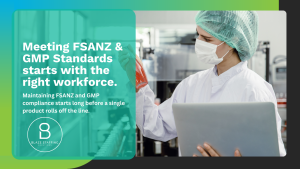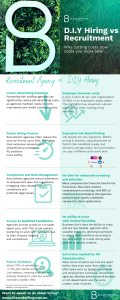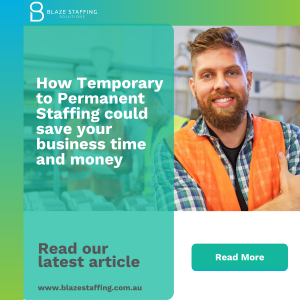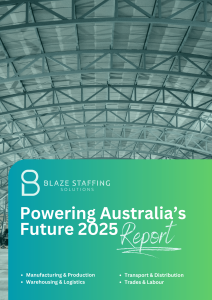In highly regulated industries such as food manufacturing, bakery production, and pharmaceuticals, compliance is not just a box-ticking exercise -it’s an operational imperative. Whether you’re producing baked goods for retail shelves or compounding medicines in sterile facilities, strict adherence to food and safety standards is essential. In Australia, these standards are governed primarily by Food Standards Australia New Zealand (FSANZ) and Good Manufacturing Practice (GMP) regulations.
Yet, one critical factor is often underestimated in compliance strategies: the workforce.
At Blaze Staffing Solutions, we’ve seen first-hand that maintaining FSANZ and GMP compliance starts long before a single product rolls off the line. It begins at the point of hire. When businesses invest in staff who are properly trained, understand regulatory expectations, and operate with a safety-first mindset, compliance becomes a natural byproduct of a strong workforce culture.
Understanding FSANZ: The Food Safety Authority
Food Standards Australia New Zealand (FSANZ) is a statutory authority responsible for developing and managing food standards across Australia and New Zealand. FSANZ sets out the Food Standards Code, which addresses:
- Food labelling and packaging
- Food additives and processing aids
- Contaminants and residues
- Microbiological and chemical safety
- Food hygiene practices
For food and beverage manufacturers, meeting FSANZ requirements means operating under a robust food safety program that often includes hazard analysis and critical control point (HACCP) systems. Staff must understand hygiene practices, contamination risks, allergen controls, and temperature management.
This is where the workforce plays a pivotal role. A single breach caused by poor hygiene or inadequate knowledge can result in recalls, reputational damage, and even regulatory penalties.
Blaze’s Insight: We recently worked with a bakery client facing FSANZ scrutiny due to several non-conformances found during a routine audit. The cause? Inadequate induction training for new hires on allergen cross-contamination protocols. Our solution included redesigning their onboarding process, providing refresher training for existing staff, and introducing skills-based testing. The client passed its follow-up audit with no corrective actions required.
What is GMP and Why Does It Matter?
Good Manufacturing Practice (GMP) is a system that ensures products are consistently produced and controlled to quality standards. In Australia, the Therapeutic Goods Administration (TGA) enforces GMP for pharmaceutical manufacturers, while food and supplement manufacturers may also adopt GMP principles voluntarily or as part of international trade requirements.
GMP covers a wide range of production areas:
- Sanitation and hygiene
- Equipment and maintenance
- Quality control and record keeping
- Personnel competency and behaviour
- Risk management and contamination prevention
Unlike FSANZ, which applies broadly to food standards, GMP focuses on the how of manufacturing – the systems and processes that ensure a clean, consistent, safe product every time. The workforce must be deeply familiar with these processes and operate with absolute consistency and discipline.
Blaze’s Observation: One of our pharmaceutical clients reported recurring errors in batch documentation, which triggered a TGA inspection. The issue stemmed from casual contractors unfamiliar with the site’s GMP documentation protocols. Blaze responded by creating a GMP-specific induction and recruiting staff with prior TGA experience. We also facilitated a buddy system to support knowledge transfer from senior staff to temps. Errors reduced by 90% in the following quarter.
Why Compliance Begins at Recruitment
The assumption that compliance is the domain of Quality Assurance teams alone is outdated. From cleaners to line operators to warehouse pickers, every staff member has a role to play in upholding FSANZ and GMP.
Hiring without a compliance lens is risky. Blaze Staffing Solutions integrates industry-specific screening and training into our recruitment process:
- Compliance-Focused Candidate Screening
- We assess candidates’ prior experience with HACCP, GMP, TGA, and FSANZ-relevant processes.
- Behavioural interviewing helps us gauge safety-first mindsets.
- Pre-Placement Training
- We deliver online and onsite compliance training specific to each client’s standards.
- Training modules include allergen awareness, personal hygiene, PPE use, and documentation protocols.
- Ongoing Workforce Audits
- For long-term placements, Blaze conducts quarterly compliance audits, feedback sessions, and refresher training to maintain standards.
The Consequences of Getting it Wrong
In regulated sectors, the cost of non-compliance can be severe. Consider the potential consequences:
- Product Recalls: A contaminated product line can lead to nationwide recalls, costing millions in lost revenue and damaging consumer trust.
- Legal Liability: Failing to meet FSANZ or GMP standards can expose businesses to legal action, particularly if public health is endangered.
- Supply Chain Interruptions: Non-compliance can disrupt contracts, delay exports, or even see facilities shut down until corrective actions are taken.
- Brand Damage: In the food and pharma space, your brand reputation hinges on trust. A single incident can take years to recover from.
In many of these cases, issues stem not from equipment or strategy, but from inconsistent staff practices. Hiring right helps future-proof the business.
Building a Culture of Quality
Embedding compliance into workplace culture doesn’t happen overnight. It starts with the people you hire and the expectations you set.
Blaze advocates for a “Quality Culture” approach:
- Hire for values, not just skills. Technical skills can be taught, but attention to detail, integrity, and accountability are non-negotiable.
- Create strong onboarding pathways. Compliance expectations must be set from day one.
- Empower staff. When frontline workers understand the why behind standards, they are more likely to follow them.
- Celebrate wins. Recognise teams that pass audits, identify risks early, or maintain zero non-conformance periods.
Case Study Highlight: A food manufacturer client implemented Blaze’s compliance and onboarding program, including reward schemes. Within six months, staff self-reporting of near misses and errors increased by 65%, contributing to a proactive safety environment.
Partnering with Blaze for Compliance-Ready Staffing
Blaze Staffing Solutions isn’t just a provider of labour hire. We are a partner in operational excellence. Our team understands the critical link between staffing and compliance, and we design our services to protect and strengthen your reputation.










